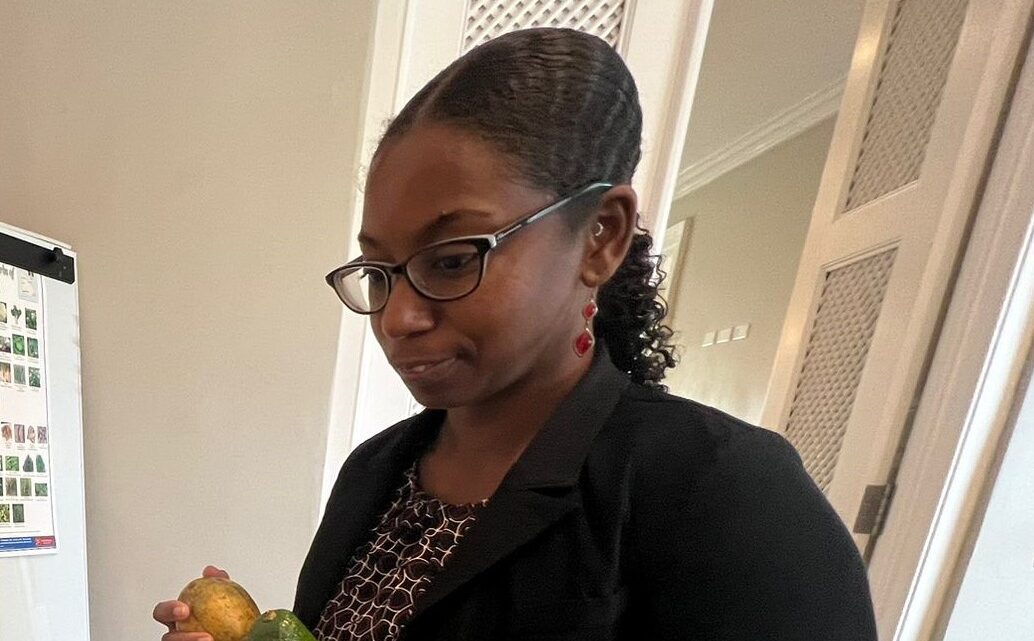Extreme Weather Causes Local Produce Shortages and Price Hikes, Predicts Chief Agricultural Officer

November 16, 2023
Extreme weather conditions have caused local produce shortages and price increases. Chief Agricultural Officer Keeley Holder believes farmers' yields will recover by Christmas despite reduced sweet potato and yam production.
Extreme weather conditions have resulted in shortages of local produce and a hike in prices, but Chief Agricultural Officer Keeley Holder is optimistic farmers’ yields will rebound and be able to meet demand for the upcoming Christmas season.
She said 2023 has been an unusual year for growing sweet potatoes which are typically resilient, while the extreme heat has had a devastating impact on yams, leading to reduced yields.
“From what I understand, the yields have been significantly down and that’s one of the things that I think we need to understand,” Holder said on Wednesday at Warrens Great House, following a presentation to schools of visual aids for the identification of local fruits and vegetables ‘
“If the farmers are growing expecting to get a particular yield, and as a result of the climate impacts they are only seeing maybe 30 or 40 per cent of that yield, then obviously their return on investment is going to be lower, so the prices are going to rise as a result of that. But going into November, you start to see the rebounding so I would expect to see that rebound coming on to Christmas.”
The chief agricultural officer added: “Typically, at this time of the year, you begin to see a decline in tomatoes and we are seeing that. There are some tomatoes available and already in November, we are starting to see a rebound. We were seeing shortages of beans as far back as in September. The chives in particular seem to be heavily impacted in September and October but we are seeing a rebound on those as well.
“I think cucumbers have been fairly plentiful and have weathered the storm well, so too has butternut squash. Pumpkins are always available at this time of the year and we are continuing to see that trend as well. There has been a dip in sweet peppers, and lettuce has also been a crop that has been impacted. The heat in particular will cause the lettuce to bolt, meaning that it would start to grow tall very quickly, so what we are seeing in response to that is the farmers are harvesting the lettuce earlier so you are seeing smaller heads of lettuce”.
Earlier this month, Chief Executive Officer of the Barbados Agricultural Society (BAS) James Paul and President of the Barbados Association of Retailers, Vendors and Entrepreneurs (BARVEN) Alister Alexander told Barbados TODAY that significant weather events continued to negatively impact the agriculture sector.
Both predicted that the current shortages of six to eight-week crops, among other produce, will extend into the Christmas season.
Meanwhile, Holder indicated that it was not unusual to see a dip in the availability of crops due to heavy rainfall at this time of the year. In fact, she said that for decades, at this time of the year, there has been a shortage of tomatoes, peppers and other produce due to heavy rains.
“But what we are seeing now as a result of climate change is the severity of the impacts this year because we would have had a very lengthy period of drought and heat in September, which is typically a high rainfall period, and farmers planting high rain-fed crops would have been impacted because they were not expecting to not have enough water during that time of the year,” the agriculture chief said.
“There was that extreme followed by another extreme with Hurricane Tammy and subsequent days of flooding events. So, this would impact the plants in terms of their growth, particularly if it takes a while for the flooding to dissipate into the water table. So what you are seeing now is from several days of flooding, the soils are already saturated and then you would get another set of flooding, so the plants are not getting any time to recover.” (AH)


